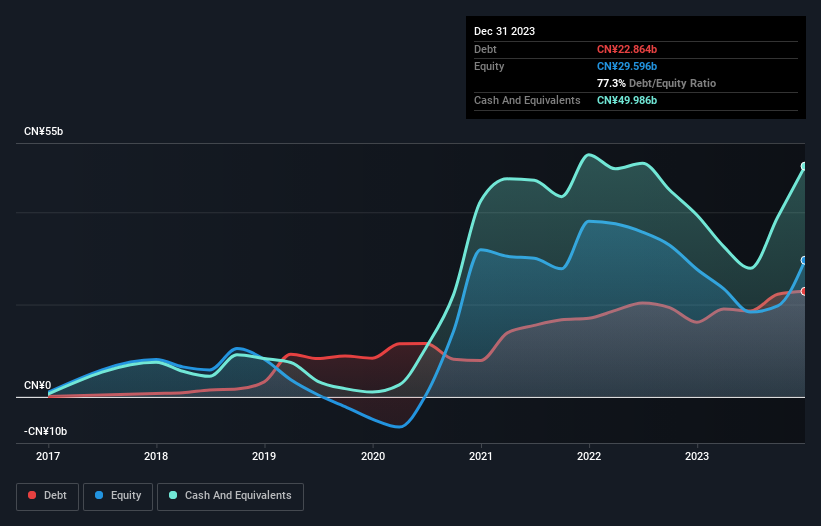Some say volatility, rather than debt, is the best way to think about risk as an investor, but Warren Buffett famously said that 'Volatility is far from synonymous with risk.' It's only natural to consider a company's balance sheet when you examine how risky it is, since debt is often involved when a business collapses. Importantly, NIO Inc. (NYSE:NIO) does carry debt. But should shareholders be worried about its use of debt?
When Is Debt Dangerous?
Generally speaking, debt only becomes a real problem when a company can't easily pay it off, either by raising capital or with its own cash flow. If things get really bad, the lenders can take control of the business. However, a more common (but still painful) scenario is that it has to raise new equity capital at a low price, thus permanently diluting shareholders. Of course, plenty of companies use debt to fund growth, without any negative consequences. When we examine debt levels, we first consider both cash and debt levels, together.
View our latest analysis for NIO
How Much Debt Does NIO Carry?
You can click the graphic below for the historical numbers, but it shows that as of December 2023 NIO had CN¥22.9b of debt, an increase on CN¥16.2b, over one year. But on the other hand it also has CN¥50.0b in cash, leading to a CN¥27.1b net cash position.

How Healthy Is NIO's Balance Sheet?
According to the last reported balance sheet, NIO had liabilities of CN¥57.8b due within 12 months, and liabilities of CN¥30.0b due beyond 12 months. Offsetting these obligations, it had cash of CN¥50.0b as well as receivables valued at CN¥6.73b due within 12 months. So it has liabilities totalling CN¥31.1b more than its cash and near-term receivables, combined.
This deficit isn't so bad because NIO is worth a massive CN¥82.3b, and thus could probably raise enough capital to shore up its balance sheet, if the need arose. But it's clear that we should definitely closely examine whether it can manage its debt without dilution. Despite its noteworthy liabilities, NIO boasts net cash, so it's fair to say it does not have a heavy debt load! There's no doubt that we learn most about debt from the balance sheet. But ultimately the future profitability of the business will decide if NIO can strengthen its balance sheet over time. So if you want to see what the professionals think, you might find this free report on analyst profit forecasts to be interesting.
Over 12 months, NIO reported revenue of CN¥56b, which is a gain of 13%, although it did not report any earnings before interest and tax. We usually like to see faster growth from unprofitable companies, but each to their own.
So How Risky Is NIO?
Statistically speaking companies that lose money are riskier than those that make money. And in the last year NIO had an earnings before interest and tax (EBIT) loss, truth be told. And over the same period it saw negative free cash outflow of CN¥16b and booked a CN¥21b accounting loss. But the saving grace is the CN¥27.1b on the balance sheet. That means it could keep spending at its current rate for more than two years. Overall, we'd say the stock is a bit risky, and we're usually very cautious until we see positive free cash flow. There's no doubt that we learn most about debt from the balance sheet. But ultimately, every company can contain risks that exist outside of the balance sheet. Be aware that NIO is showing 2 warning signs in our investment analysis , you should know about...
Of course, if you're the type of investor who prefers buying stocks without the burden of debt, then don't hesitate to discover our exclusive list of net cash growth stocks, today.
Valuation is complex, but we're here to simplify it.
Discover if NIO might be undervalued or overvalued with our detailed analysis, featuring fair value estimates, potential risks, dividends, insider trades, and its financial condition.
Access Free AnalysisHave feedback on this article? Concerned about the content? Get in touch with us directly. Alternatively, email editorial-team (at) simplywallst.com.
This article by Simply Wall St is general in nature. We provide commentary based on historical data and analyst forecasts only using an unbiased methodology and our articles are not intended to be financial advice. It does not constitute a recommendation to buy or sell any stock, and does not take account of your objectives, or your financial situation. We aim to bring you long-term focused analysis driven by fundamental data. Note that our analysis may not factor in the latest price-sensitive company announcements or qualitative material. Simply Wall St has no position in any stocks mentioned.
About NYSE:NIO
NIO
Designs, develops, manufactures, and sells smart electric vehicles in China, Europe, and internationally.
Adequate balance sheet and slightly overvalued.
Similar Companies
Market Insights
Community Narratives


